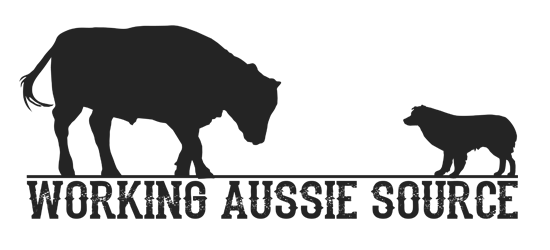WHEN TO START TRIALING
by Tenley Dexter and Maarten Walter
Question: Have been using my Aussie for chores and taken some formal lessons on herding. Question is at what point would one consider entering a trial: with what behaviors needed as a starting point.
Tenley Dexter comments:
Ah, this is an easy question! When I can take a young dog away to a friend’s farm to work stock that my dog has never seen, in a place that is totally unfamiliar, and still have my dog listen to me and yet be able to control its stock, then the dog is ready to trial. We all get a very unrealistic picture of what our dog’s can handle and accomplish when we only work at home and on our own stock or even on lesson sheep at a trainer’s place. Only when you take that dog and place it on stock that have never seen the dog before and in unfamiliar surroundings do you get a true sense of what that dog is capable of and where the dog truly is in its training.
The ASCA started course is very simple and so to go and try to simulate the course at an unfamiliar place and on unfamiliar stock is very easy to do. If your dog can handle that situation well, chances are the dog can handle trialing for the first time well.
Behaviors required would be an excellent stop in any situation and even with very high pressure on the dog (example: dog perceives stock is getting away but handler knows the dog can’t win and so wants to stop dog to prevent a wreck). Second, being able to take frazzled stock out of the take pen with some amount of composure is also very important.
Many a started dog fails in this department and so the stock is bouncing off the pen walls and the stock already mistrusts the dog and the mood is set for the rest of the run, with stock fleeing for their lives rather than moving off the dog in a controlled manner. Finally, the dog being able to work stock that is less dog broke than lesson stock, which is very forgiving and is worked by a lot of less-than-stellar dogs. Even the nicest stock that is shipped away from home to unfamiliar surroundings and then worked by unfamiliar dogs with unfamiliar handlers can turn into a challenge for advanced dogs let alone started dogs.
Do yourself and your dog a favor and find somewhere to do a test run before you enter your first trial. It will show you your dog’s strengths and also all the holes in your dog that you can work on.
Maarten Walter comments:
You should ask yourself why are you trialing? To put titles on the dog? (wrong answer:) To test the dog to see what level he or she is at? Could be good. Or to give the dog experience in different situations? Also possible. Anyway, think about that question and you’ll have a better idea as to when you’re ready to trial.
You must have a good stop and a recall out there. When things go bad or the stock are going in the right direction is a good time to show that off. Nothing’s worse (well, almost nothing) than a dog that “cuts the livestock” meaning running through the direction that the stock should be going. And don’t save that stop for when you’re penning. Most judges don’t look for an up and down dog but still, there are times to settle things.
Is your dog relaxed in new situations, working new stock? If not, you may not be ready to trial yet. How will you know unless you try it? Well, the ASCA arena is pretty large. If your dog decides to take things into its own hands, you’ll be unable to stop him. So you’d better see what they’re going to be like beforehand in some other place.
Personally, I like to have decent flanks and a straight walk-up on my dog before I start trialing. Lately I like the notion of having a dog at least a level higher than what I’m trialing in. So I won’t trial a dog in Started until they’re doing Open work. There’s no reason (in my mind) to trial a dog when they’re young. The pressure is too much, they learn to get away with doing the wrong things, etc. Just not good for the dog.
The message I guess is to take your time. When in doubt – don’t trial your dog until later.
This article first appeared as a series of posts on the Yahoo group Aussie-Herders


